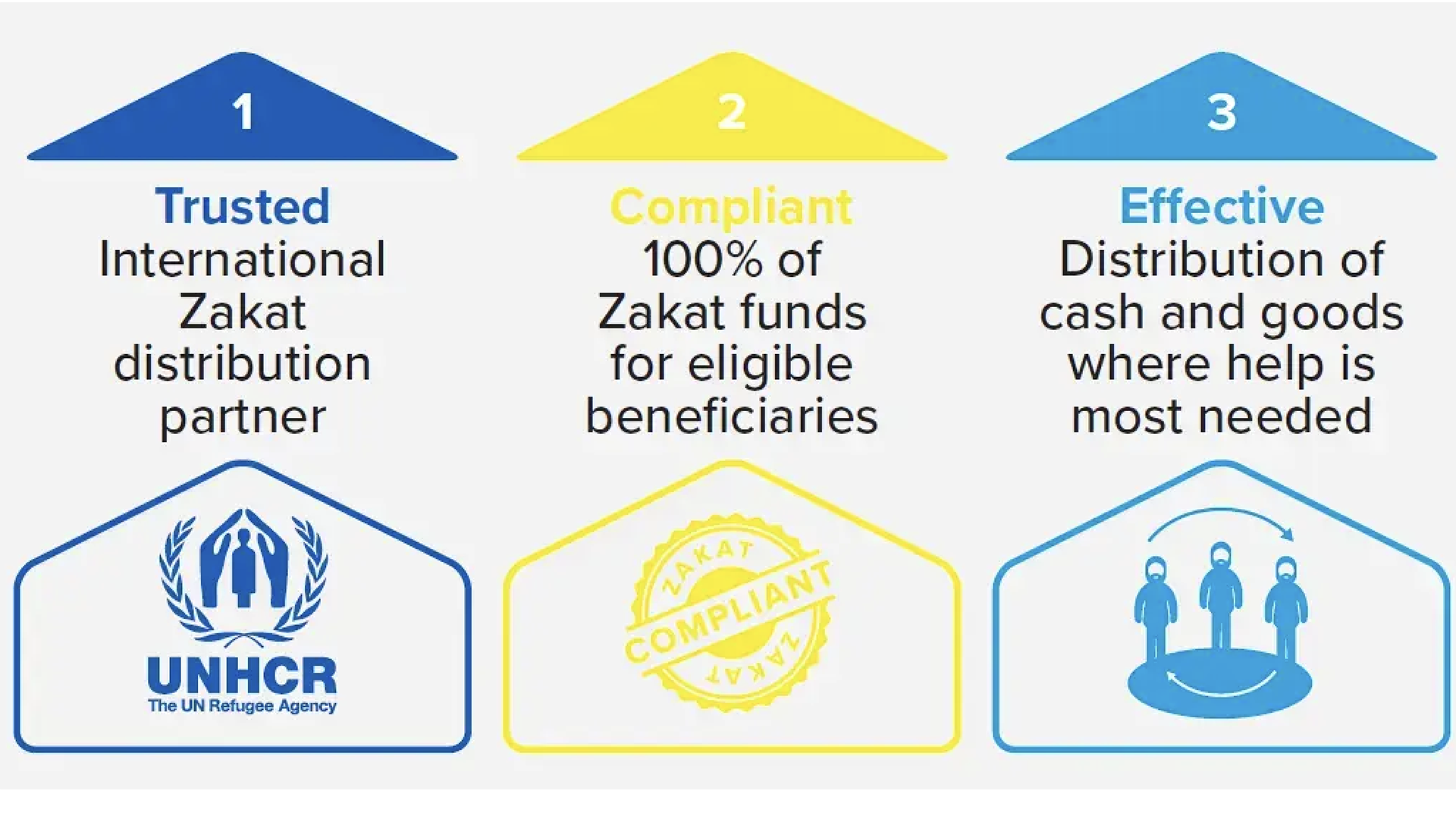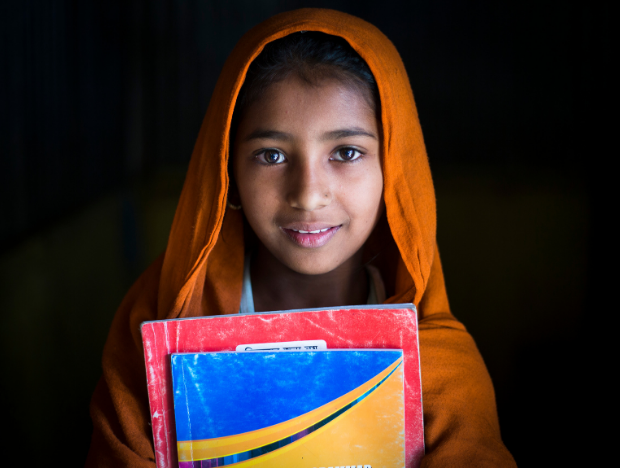There are more than 114 million people forcibly displaced globally and nearly 50 percent are refugees from Muslim countries. Your gift to USA for UNHCR can help transform lives.

UNHCR’s Refugee Zakat Fund is a trusted, Sharia compliant and effective distributor that maximizes the power of zakat to transform the lives of refugees, including in hard-to-reach areas.
UNHCR ensures 100 percent of zakat funds are distributed to those most in need by covering overhead costs from non-zakat sources. This guarantees that 100 percent of zakat contributions are given to the most vulnerable, zakat eligible recipients in critical need.
The Refugee Zakat Fund supports vulnerable families by providing them with cash assistance, enabling them to support their essential needs. The fund follows rigorous governance tools to ensure transparency at every stage. This governance approach entails the following pillars:
Zakat Compliance
Recognition: The Fund is zakat compliant, backed by over 17 fatwas from credible scholars and institutions.
Infrastructure: The Fund follows Islamic scholar recommendations by dedicating 100 percent of funds to eligible refugees.
Compliance review: UNHCR coordinates annual, third party field visits to oversee distribution and publish compliance reports.
Assessment and Monitoring
Vulnerability assessments: UNHCR regularly identifies and maintains a database of eligible recipients based on their vulnerability.
Innovation: Technology ensures effective distribution and minimizes fraud and duplication.
Post distribution monitoring: UNHCR monitors projects twice yearly to measure impact and improve implementation.
Financial Governance
Management & accountability: Zakat funds are secured in a dedicated interest-free bank account in Geneva.
Traceability: All funds are dedicated to zakat compliant cash assistance programs in eligible countries with critical needs.
Transparency: UNHCR publishes annual Islamic Philanthropy reports and provides partners with customized reports.
The Islamic Philanthropy Report highlights the global impact of zakat and sadaqah contributions on the lives of refugees and internally displaced persons. Thanks to your support, UNHCR has reached almost 6 million refugees since 2017.

UNHCR’s Refugee Zakat Fund is a credible, Sharia compliant, pioneering structure that effectively distributes zakat to transform the lives of the most vulnerable refugee and displaced families.
UNHCR’s Refugee Zakat Fund is subject to rigorous governance and oversight, ensuring transparency at every step, from donation to provision of assistance. The Fund is zakat compliant, backed by over 17 fatwas from respected scholars and institutions.
Canadian Council of Imams
The Canadian Council of Imams is a collective leadership of Imams (Ministers of Religion) in Canada. Established in 1990, the Council has been serving the Canadian Muslim communities throughout the nation in different capacities as well as acting as a unifying platform for Canadian Imams and chaplains. Read their endorsement letter here.
The Fatwa Council of Tareem
The Fatwa Council of Tareem is located in Hadramaut, Yemen. Hadramaut has been a major centre for scholarship for over a millennium and has produced many of the world’s leading Shafi’i scholars. Learn more here.
Sheikh Abdullah bin Bayya
Sheikh Abdullah bin Bayya is a renowned scholar from Mauritania. Sheikh Abdullah bin Bayya is the Chairman of the UAE’s Fatwa Council, and an instructor at King Abdulaziz University in Jeddah. Learn more here.
Dr. Sheikh Ali Gomaa
Dr. Sheikh Ali Gomaa is the former Grand Mufti of the Arab Republic of Egypt and professor of Islamic jurisprudence at Al-Azhar University. He is currently a member of Al-Azhar’s Council of Senior Scholars. Learn more here.
Tabah Foundation
Based upon our previous report and taking into consideration new fatwas from Dr Sheikh Ali Gomaa and The Fatwa Council of Tareem, Tabah approves UNHCR’s plan to distribute goods in place of cash provided that UNHCR can show that goods are purchased at a fair market price, and proof of delivery of said goods. Additionally, UNHCR may use Zakat to cover charges related to the storage and transport of said goods. This arrangement is only recommended in locations where the need for in-kind distribution is higher than cash distribution, or when distributing cash isn’t possible, which is the case for UNHCR’s operation for Rohingya refugees in Bangladesh.
International Islamic Fiqh Academy | KSA
The International Islamic Fiqh Academy (IIFA) was created in 1981 and is located in Jeddah, KSA. It is a subsidiary of the Organisation of Islamic Cooperation (OIC), which is the largest organization representing the Muslim world with a membership of 57 states spread over four continents. The Academy’s mission is to provide religious guidance on modern legal, social, cultural and economic issues. It is an international body composed of over 65 Muslim scholars from all over the world and is as such considered one of the leading religious references for Muslims worldwide.
After studying the various governance parameters of the Refugee Zakat Fund, including:
IIFA concluded in July 2020 that UNHCR is allowed to collect and distribute Zakat funds through its Refugee Zakat Fund, as long as it commits to the above-mentioned parameters.
Muslim World League
The Muslim World League (based in the Holy City of Mecca, Kingdom of Saudi Arabia) was established in 1962 following a resolution adopted during a meeting of the World Muslim Congress, held in the Holy City of Mecca on 14 Dhu Al-Hijjah 1381 AH (May 18 1962 AD). Learn more here.
Dar al-Ifta al-Missriyyah
Dar al-Ifta al-Missriyyah is one of Egypt’s centers for Islamic legal research. It was established in 1895 and is considered one of the earliest modern fatwa producing institutes. Learn more here.
International Shariah Research Academy (ISRA)
International Shariah Research Academy (ISRA) was established in 2008 by the Central Bank of Malaysia as an Islamic finance and Shariah research institution. ISRA is recognized globally as a leading Global Premier Research Academy in the Islamic Finance industry, and has more than a decade of experience verifying and providing essential research on Islamic Finance to some of the top institutions around the world.
In February 2021, ISRA endorsed UNHCR’s Zakat collection and distribution mechanisms as Zakat-compliant. The endorsement confirms that UNHCR’s Refugee Zakat Fund meets the following criteria:
ISRA also included additional recommendations to further improve the process of Zakat-compliance by UNHCR.
The Council of Senior Scholars of Morocco
The Council of Senior Scholars of Morocco is the highest official religious authority in Morocco, and includes a fatwa council. It follows the Maliki School. Learn more here.
Al-Azhar Islamic Research Academy (AIRA)
The university-mosque of Al-Azhar, situated in Cairo, Egypt, is the foremost center of religious learning in the Muslim world and plays a significant intellectual role in Egypt and beyond. Al-Azhar was built in 970 as a mosque and became an institution in 1171. Al-Azhar Islamic Research Academy is the institution’s supreme body for Islamic research.
Al-Azhar Islamic Research Academy issued a fatwa in March 2021 allowing UNHCR to receive and distribute Zakat funds, highlighting that most of the Zakat categories apply to refugees and internally displaced people. Learn more here.
Tri State Imam Council
The UNHCR sent a request for a fatwa from the Tri State Imam Council regarding the permissibility of UNHCR receiving Zakat funds from Muslims from different countries of the world and distributing it to those who deserve it from among the Muslims. The Tri State Imam Council’s response is follows:
The UNHCR is a global institution that has a global trust, and is not an institution which belongs to a particular country or party as much as it is an institution for all mankind, and after reviewing and making sure that the institution follows the Sharia’s regulations for distributing Zakat, as well as having the ability to reach the needy anywhere, as well as not deducting any administrative expenses. It distributes 100% of the collected Zakat funds, so the Tri state has no objection to the UNHCR collecting and distributing Zakat funds.
What to know about Ramadan and how refugees celebrate
Ramadan is a time when people come together to show kindness and solidarity. Learn more about this holy month and how Muslims around the world will be celebrating and helping refugees.
Learn MoreHow Syrian Refugees Celebrate Ramadan
Ramadan is marked by spiritual reflection, increased generosity and spending time with family. But for many Syrian refugees, there may be less to eat and fewer people to celebrate with this Ramadan.
Learn MoreHow cash assistance is helping refugees in Yemen and Afghanistan this Ramadan
Here's how refugees in Yemen, Afghanistan, Bangladesh and Iraq are observing Ramadan, how UNHCR is helping them celebrate amid conflict and how you can help.
Learn MoreWhat is Iftar? How refugees break fast during Ramadan
As we celebrate Eid al-fitr and the end of Ramadan, see how these refugee families are celebrating and finding joy despite their circumstances.
Learn More


